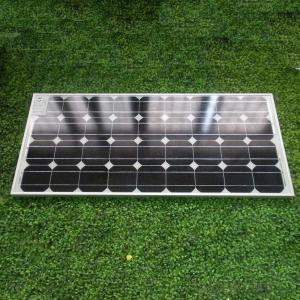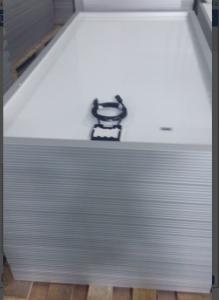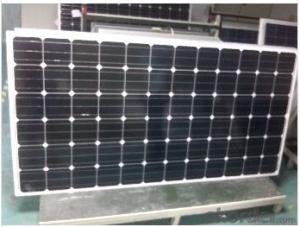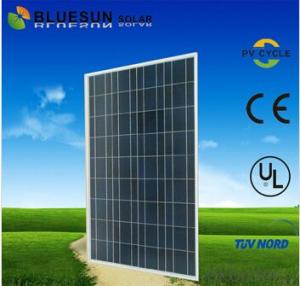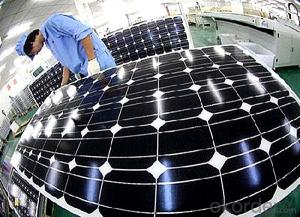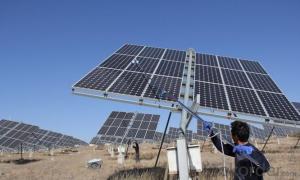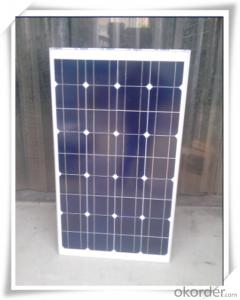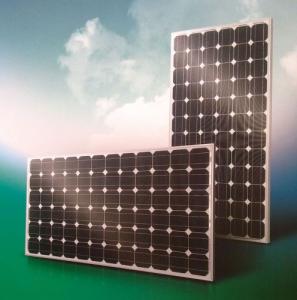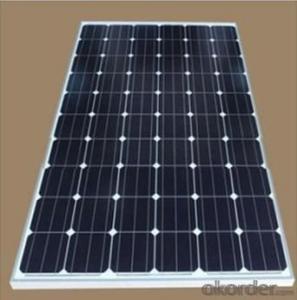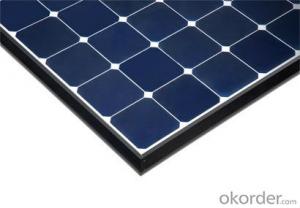wholesale 250W Monocrystalline PV Solar Panel CNBM
- Loading Port:
- Qingdao
- Payment Terms:
- TT OR LC
- Min Order Qty:
- 10 set
- Supply Capability:
- 300000 set/month
OKorder Service Pledge
OKorder Financial Service
You Might Also Like
High Efficiency 250W Monocrystalline PV Solar Panel
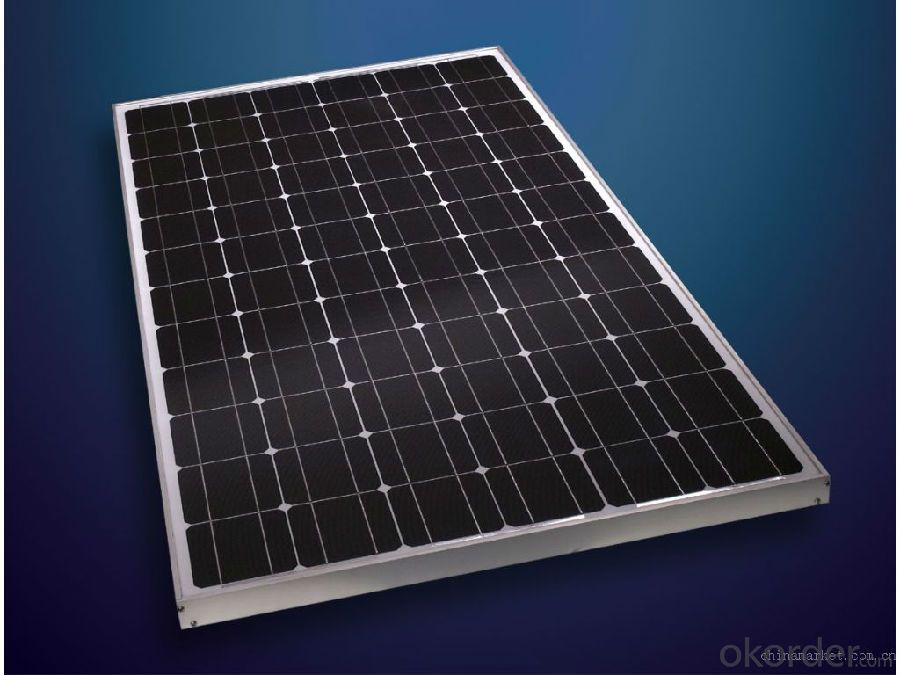
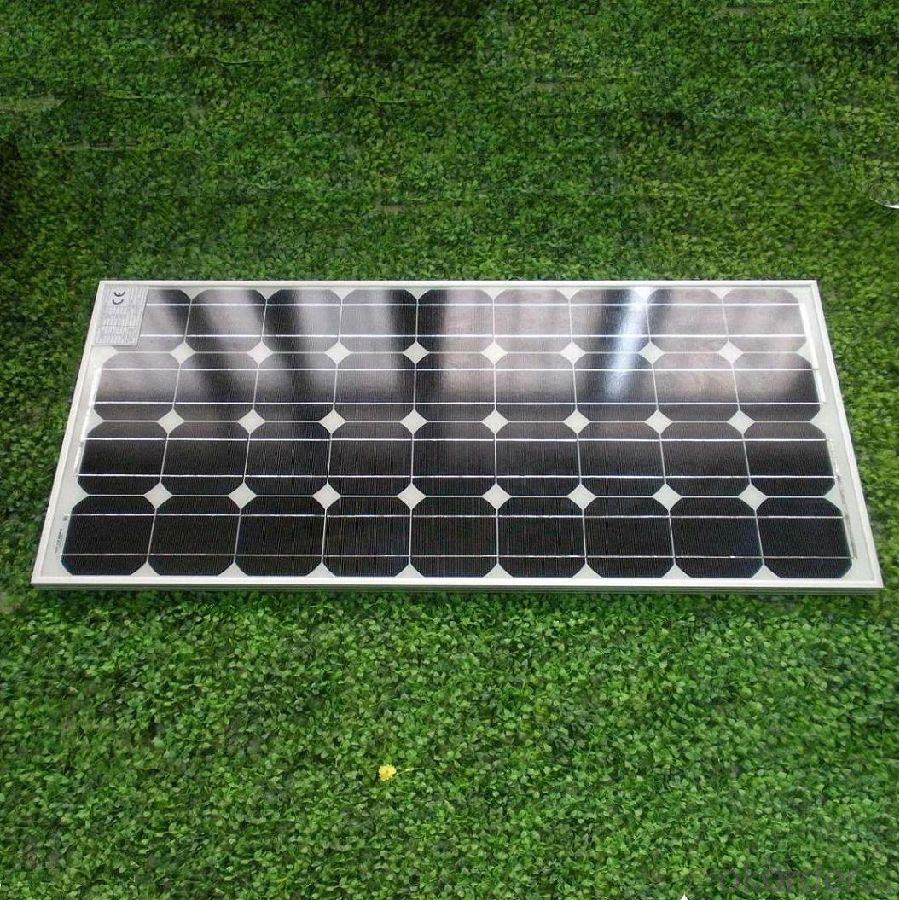
Quick Details
Place of Origin: | China (Mainland) | Brand Name: | CNBM | Model Number: | XRP-156M-250W |
Material: | Monocrystalline Silicon | Size: | 1620x992x40mm | Number of Cells: | 60 |
Max. Power: | 250w | Optimum Operating Voltage (Vmp): | 28.8V | Optimum Operating Current (Imp): | 8.68A |
Open Circuit Voltage (Voc): | 36V | Short Circuit Current (Isc): | 8.87A | Maximum Power at STC (Pmax): | 250W |
Operating Module Temperature: | -40 °C to +85 °C | Maximum System Voltage: | 1000 V DC (IEC) / 600V DC (UL) | Maximum Series Fuse Rating: | 15A |
Packaging & Delivery
Delivery Detail: | two weeks after order confirmation |
Features:
1) High Module conversion efficiency, through superior manufacturing technology
2) 0 to +5W positive tolerance for mainstream products
3) Certified to withstand high wind loads and snow loads
4) Anodized aluminum is for improving corrosion resistance
5) Anti-reflective, Highly transparent, low iron tempered glass
6) Excellent performance under low light environment
Benefit:
25-year performance warrant
10-year Product warranty
Electrical Characteristics:
Item No. | XRM-250W |
Optimum Operating Voltage (Vmp) | 28.8V |
Optimum Operating Current (Imp) | 8.68A |
Open Circuit Voltage (Voc) | 36V |
Short Circuit Current (Isc) | 8.87A |
Maximum Power at STC (Pmax) | 250W |
Cell Efficiency | 17.70% |
Operating Module Temperature | -40 °C to +85 °C |
Maximum System Voltage | 1000 V DC (IEC) / 600V DC (UL) |
Maximum Series Fuse Rating | 15A |
Power Tolerance | 0/+5 % |
STC: lrradiance 1000 W/m2, module temperature 25 °C, AM=1.5;
Best in Class AAA solar simulator (IEC 60904-9) used, power measurement uncertainty is within +/- 3%
Mechanical Characteristics:
No. of Cells | 60(6X10) |
Dimensions | 1640x992x40MM |
Weight | 20.0KGS |
Front | Glass 4.0 mm tempered glass |
Frame | Anodized aluminium alloy |
Temperature Characteristics:
Nominal Operating Cell Temperature (NOCT) | 45±2°C |
Temperature Coefficient of Pmax | -0.44 %/°C |
Temperature Coefficient of Voc | -0.33 %/°C |
Temperature Coefficient of Isc | 0.055 %/°C |
Refer to the Wmp range
Our factory can produce solar panel and solar module from 1.5W-290w (1.5w, 2.5w, 5w, 10w, 20w, 40w, 50w, 60w, 80w, 85w, 125w, 135w, 150w, 165w, 180w), according to customers requirement.
(A). Wmp range: 0.01W-6W, to be sealed with epoxy resin on PCB (printed circuit board), or to be sealed in plastic directly.
(B). Wmp range: 0.01W-15W, to be encapsulated with PET, on PCB (printed circuit board)
(C). Wmp range: 1W-60W, to be encapsulated with PET, on stainless steel, with holes for assembling purpose.
(D). Wmp range: 1W-290W, to be encapsulated with tempered glass, EVA, TPT, together with aluminium frame, junction box and (if necessary)diode and cable.
Refer to the material:
Monocrystalline solar cell or polycrystalline solar cell
Efficiency range 14%-17%, cell size 5/6.
- Q: So, I've seen cheap solar panel kits for sale from Harbor Freight, and regardless of whether or not I were to buy a set from them or someone else, I was wondering what the process of implementing a small-scale solar system into your household electrical system would be.I've read articles that started out too in-depth or were speaking of systems on a much larger scale.Can it be as easy as buying the panels and inverter, and plugging it into a socket, or is there more to it?Some of the articles I was reading had mentioned having to contract with your electrical supplier, having to have an electrician tie it all in in some special/ necessary way, using a battery pack (would this be necessary for a tied-in system?), or using the system to only power single items, like a water heater, or plugging items into a connected battery-pack, all of which I'm not sure is necessary or needed for what my goals/ means are/ would be.
- Take okorder /... This unit produces 45W for $90. Inverter is extra. Let's say this unit produces that amount of power for a full 2 hours a day, that's 45W * 2h = 540 Wh or 0.54kWh. If I save that from my electrical company, I would pay about 5 cents. $90 then takes 3800 days or 0 years. At that point, you haven't actually made any money, you've simply recovered what you paid out to buy the unit 0 years ago. Yes, electrical power prices will be going up over the long term but the output of this unit is also not going to be 45W over its lifetime (if it even lasts 0 years) so I really question the economics.
- Q: Thanks
- benefit: 0 value for the source of power No by way of product draw back: Unreliable extreme value to purchase image voltaic panels. Now once you're speaking approximately actually in basic terms utilising image voltaic power i.e. letting water sit down outdoors until the solar warms it up... Then I see no actual benefit to it as a results of fact it will not at all have the skill to warmth water on your needed temperature and it will take way too long.
- Q: Solar panels are all divided into these squares, forming a grid like pattern. Is it possible to have a single piece of solar panel?
- They are in form of panels ....panel observe heat to generate electricity
- Q: Can solar panels be used in areas with high levels of volcanic activity?
- Yes, solar panels can be used in areas with high levels of volcanic activity. While volcanic activity may pose certain challenges such as ash emissions or occasional cloud cover, solar panels can still generate electricity during periods of low activity. Additionally, solar panels can be designed and installed to withstand harsh environmental conditions, including volcanic ash deposition, ensuring their long-term functionality.
- Q: I want to add solar panels to my home. I was looking online and it seems there are so many different kinds! How does it hook up to the electrical grid? How much do I need for a 2000 sf home?
- Everyone is looking into renewable energy these days and many are looking to solar energy. The sun gives us a lot of energy that solar panels help us to use for our energy needs. Best of all, this energy is free! All you need to do is install your own solar panel. It is best to install solar panels to a rooftop before the house is roofed.
- Q: Can solar panels be installed on a remote island or location?
- Yes, solar panels can be installed on a remote island or location. Solar panels are a flexible and sustainable energy solution that can function independently of the grid, making them suitable for remote areas. They can generate electricity by harnessing sunlight, which is abundant in most locations, including islands. Additionally, advancements in solar technology have made it possible to install panels in challenging environments, such as extreme temperatures or harsh weather conditions.
- Q: Installing solar panels requires a big initial investment. Before I make this investment I want to check to see if the money I will save by installing solar panels will actually pay for this investment, in the long run. To calculate my savings, we should consider the area (square feet) I currently have available to install solar panels. Look at the available sunlight and its intensity in my state each month of the year. Based on this data estimate how much energy my solar panel will generate. Then compare that with how much energy (kWh) I currently consume based on my electricity bill.
- Your school spend $0,000 per month or per year?? Photovoltaic (Solar Panel) panels have a really large initial capital investment. If you live in a location (e.g. West Coast Desert, SoCal) where there are many sunny days so you might be able to break even quicker. Also note ,there are state and federal grants that can help ease the capital cost. Energy demand keeps going up so expect our current rates to double. People who have alternative forms like wind and solar will have the advantage when this time comes. Just think of when the US had it's oil crisis in summer of 2008, people with small efficient vehicles such as Prius's didn't feel the price increase like the people who bought cheaper large SUV's.
- Q: How much space is required for installing solar panels?
- The amount of space required for installing solar panels can vary depending on factors such as the size and type of panels, as well as the energy needs of the property. However, on average, a typical residential solar panel system requires about 100-400 square feet of roof space per kilowatt of installed capacity.
- Q: How can solar panels be used for heating water?
- Solar panels can be used for heating water by using the energy from the sun to heat up a fluid, typically water or antifreeze, which then transfers the heat to a storage tank. This heated water can be used for various purposes such as showers, washing dishes, or heating indoor spaces.
- Q: With no moving parts, no fuel piping and so on...
- ITS TO DO WITH THE PRODUCTION PROCESS
Send your message to us
wholesale 250W Monocrystalline PV Solar Panel CNBM
- Loading Port:
- Qingdao
- Payment Terms:
- TT OR LC
- Min Order Qty:
- 10 set
- Supply Capability:
- 300000 set/month
OKorder Service Pledge
OKorder Financial Service
Similar products
Hot products
Hot Searches
Related keywords
